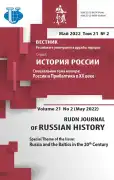Role of the Baltic Republics in Soviet-French relations during the Non-recognition Period, 1919-1924
- 作者: Magadeev I.E.1
-
隶属关系:
- Moscow State Institute of International Relations (MGIMO University)
- 期: 卷 21, 编号 2 (2022): Russia and the Baltics in the 20th Century
- 页面: 161-176
- 栏目: RUSSIA AND THE BALTICS IN THE 20TH CENTURY
- URL: https://journal-vniispk.ru/2312-8674/article/view/321993
- DOI: https://doi.org/10.22363/2312-8674-2022-21-2-161-176
- ID: 321993
如何引用文章
全文:
详细
This article aims to define the role played by the Baltic Republics in the Soviet-French relations during the non-recognition period. The author tries to determine the place, which the Baltic Republics occupied in the French and Soviet conceptions of the “sanitary cordon,” to analyse the correlation between the ambitions and the capabilities of Paris and Moscow in Eastern Europe, to demonstrate the Soviet response to the interaction between the Baltic Republics and France. The article is based on the materials taken from the different French archives, as well as from the published French and Soviet diplomatic documents. The author emphasizes the ambiguity of the role played by the “Baltic factor” in the Soviet-French relations. The Baltic Republics (especially, Latvia and Estonia) were perceived by the French leadership as a part of the “sanitary cordon” aimed to separate Germany and the Soviet Russia from each other and to preclude their eventual “collusion” in the Eastern Europe. On the contrary, Moscow aimed to weaken the “sanitary cordon.” Paris didn’t exclude that the cooperation with future Russia performing the role of the counterbalance to Germany would be more important for France than full independence of the Baltic Republics. The Kremlin and the People's Commissariat for Foreign Affairs welcomed this point of view and tried to support those French political leaders that developed such an approach. The dynamics of the post-war international relations, as well as the priority given by the French government to the “German threat”, prompted Paris to recognize the USSR, which met the interests of Moscow. The considerations of the “big politics” were more important than the voices of the “small countries” which tried to influence the interaction between the more powerful actors.
作者简介
Iskander Magadeev
Moscow State Institute of International Relations (MGIMO University)
编辑信件的主要联系方式.
Email: iskander2017@yandex.ru
ORCID iD: 0000-0002-6521-2202
Ph.D. in hist., Associate Professor of the Department of European and American Studies
76, Vernadskogo Ave., Moscow, 119454, Russia参考
- Åselius, G. “The Naval Theatres in Soviet Grand Strategy during the Interwar Period.” The Journal of Slavic Military Studies 13, no. 1 (2000): 68-89.
- Bodrov, A.V. “Pribaltiiskii flang ‘sanitarnogo kordona’.” In Pavlov, A.Ju., ed. Vol. 2 of Vrag, protivnik, soyuznik? Rossiya vo vneshnei politike Frantsii v 1917-1924 gg., 206-288. St. Petersburg: RKhGA Publ., 2021 (in Russian).
- Carley M.J. “Prelude to Defeat: Franco-Soviet Relations, 1919-1939.” In Blatt, J., ed. The French Defeat of 1940: Reassessments, 171-202. New York: Berghan Books, 2006.
- Dessberg, F. Le triangle impossible: les relations franco-soviétiques et le facteur polonais dans les questions de sécurité en Europe (1924-1935). Bruxelles: P.I.E. Lang, 2009 (in French).
- Dullin, S. Uplotnenie granits: k istokam sovetskoi politiki. 1920-1940-e. Moscow: NLO Publ., 2019 (in Russian).
- Ganin, A.V. “ ‘Svoi sredi chuzhikh i chuzhoi sredi svoikh’: polkovnik Fedor Makhin.” In Posadskii, A.V., ed. Ot ‘germanskoi’ k Grazhdanskoi: stanovlenie korpusa narodnykh vozhakov russkoi smuty, 16-59. Moscow: AIRO-XXI Publ., 2014 (in Russian).
- Gueslin, J. La France et les ‘petits États’ baltes: réalités baltes, perceptions françaises et ordre européen (1920-1932). Thèse de doctorat. Université de Paris I, 2004 (in French).
- Hogenhuis-Seliverstoff, A. “La trace ténue d’une alliance ancienne. La France et la Russie, 1920-1922.” Guerres mondiales et conflits contemporaines, no. 193 (1999): 117-130 (in French).
- Jeannesson, S. “La difficile reprise des relations commerciales entre la France et l’URSS (1921-1928)”. Histoire, économie et société, vol. 19, no. 3 (2000): 411-429 (in French).
- Ken, O.N., and Rupasov, A.I. Zapadnoe prigranich’e. Politbyuro TsK VKP(b) i otnosheniya SSSR s zapadnymi sosednimi gosudarstvami, 1928-1934 gg. 2nd ed. Moscow: Algoritm Publ., 2014 (in Russian).
- Lahaie, O. “Face à l’Allemagne vaincue, les services de renseignement français (novembre 1918 - avril 1919).” Revue historique des armées, no. 251 (2008): 61-71 (in French).
- Lasterle, Ph. “La rue Royale et la Baltique orientale: l’exemple des pays baltes (1919-1924).” In Bariéty, J. ed., Bâtir une nouvelle sécurité. La coopération militaire entre la France et les États d’Europe centrale et orientale de 1919 à 1929, 299-317. Vincennes: SHAT, 2001 (in French)
- Pavlova, M.S. Litva v politike Varshavy i Moskvy v 1918-1926 godakh. Moscow: Aspekt-press Publ., 2016 (in Russian).
- Popova, S.S. “ ‘Oni gotovy vozobnovit’ bor’bu’: Voennoe ministerstvo i MID Frantsii o beloi emigratsii v Vengrii. 1920-1921 gg.” Istoricheskii arhiv, no. 1 (1996): 41-70 (in Russian).
- Reynolds, D. The Long Shadow: The Legacies of the Great War in the Twentieth Century. New York: Norton, 2014.
- Stoker, D. Britain, France and the Naval Arms Trade in the Baltic, 1919-1939. London: Routledge, 2003.
- Valge, Ja. “Podgotovka Sovetskim Soiuzom gosudarstvennogo perevorota v Estonii v 1924 g.” Peterburgskii istoricheskii zhurnal, no. 1 (2015): 183-201 (in Russian).
- White, Ch.A. British and American Commercial Relations with Soviet Russia, 1918-1924. Chapel Hill: The University of North Carolina Press, 1992.
补充文件









